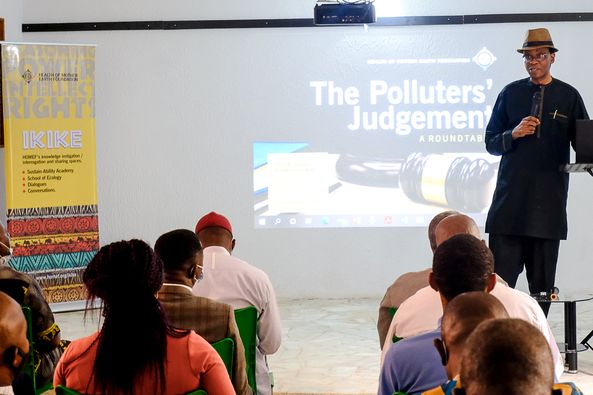Welcome words by Nnimmo Bassey, Director, HOMEF, at the Polluters’ Judgements Roundtable held at Oronto Douglas Conference Hall, HOMEF Head Quarters, Benin City, Nigeria.
When Chief Fidelis Oguru, Mr Alali Efanga, Chief Barizaa Dooh and Elder Friday Alfred Akpan filed a suit against Shell Petroleum Development Company (SPDC) thirteen years ago, they would not have imagined it would take so long before a waft of victory would come their way. 29 January 2021 will go down in the annals of international jurisprudence as very significant because on that day, the Appeal Court at The Hague determined that the Royal Dutch Shell subsidiary was liable for oil spills that ravaged Goi in Ogoni, Rivers State and Oruma in Bayelsa State. Earlier in 2013, the lower court had held that SPDC was culpable over an oil spill that occurred at Ikot Ada Udo, Akwa Ibom State.
A cap to the rain of judgements against one of the topmost polluters in the Niger Delta occurred on 12 February 2021 at the Supreme Court in the United Kingdom. The Court ruled in the suit brought before it by HRH Emere Godwin Bebe Okpabi and the Council of Chiefs (suing for themselves and thousands of citizens from Oghale Kingdom and Bille Kingdom, in Rivers State), against Royal Dutch Shell Plc that the oil mogul can be sued in the United Kingdom for environmental offences committed by its subsidiary in the Niger Delta.
The spills at Goi and Oruma go as far back as 2004 and 2005. Besides ruling that the oil spills were not caused by third party interferences or so-called sabotage, the court ruled that the parent company, Royal Dutch Shell, has a “duty of care” in the activities of its subsidiaries.
The Supreme Court judges in the UK noted that a recently decided case brought by Lungowe against Vedanta Resources Plc was similar to the Oghale and Bille cases. In that case, the Supreme Court had determined that civil claims for negligence brought by Zambian claimants against Vedanta, the parent company and its Zambian subsidiary (Konkola Copper Mines plc) for damages suffered in Zambia could be heard in English courts.
These cases mean a lot to the suffering peoples of the Niger Delta whose cry for justice has often been met with indifference or with utter violence as was the case that led to the execution of Ken Saro-Wiwa and other Ogoni leaders. The judgements clarified that parent companies can be held accountable for ecological crimes committed by their subsidiaries and not continue to enjoy financial returns from such misadventures.
Personally, it comes as therapeutic as Goi in Ogoni has for nearly two decades become the symbol of the devastated Niger Delta. It is one community polluted, degraded and burnt by oil and whose people have have been forced to suffer the indignity of living as refugees dispersed across Ogoni and other Niger Delta communities. Sights of kids swimming in the polluted creek at Goi and fishers desperately searching for invisible fish and other aquatic resources have been, and still are, heartbreaking.
These judgements offer the people some hope that their peaceful fight for justice is finally being vindicated. It also offers the polluters a great opportunity, an incentive indeed, to do the right thing by swiftly negotiating and compensating the people and urgently remediating and restoring their environment.
The struggle for justice also illustrates the power of solidarity across borders. The judgements highlight the power of peoples united and collaborating for a common cause. The case of the four Nigerians against Shell benefitted from a partnership between the Friends of the Earth groups in The Netherlands and Nigeria. The case in the UK benefited from the untiring commitment of the law firm, Leigh Day.
We are gathered here today to examine, discuss and highlight the significance of these judgements to the global struggles for environmental justice. We also hope that the outcomes will strengthen the cause for justice for our peoples and for our environment. Indeed, the judgements should be seen as clarion calls for the utter abolishment of the persistent ecocidal ecological and economic crimes in the Niger Delta.
We are privileged to have in our midst, Barrister Chima Williams, one of the lawyers for the four Nigerians that sued Shell in the Netherlands and he will be giving the lead paper helping us understand the implications of the judgements against the transnational oil corporation, Shell. We are equally privileged to have one of the litigants, Chief Eric Barizaa Tete Dooh of Goi Community, here with us to share his reaction to the judgement after so many years of tortuous litigation and the passing on of his father who had commenced the suit. We also have here, Comrade Celestine Akpobari, a frontline Ogoni environmental justice activist who will help situate the story of hope and pain in Ogoniland as representative of the Niger Delta.
The unending pollution of the Niger Delta can be summed as blatant ecological and economic corruption. Thus, no better person to comment on the presentations today than an astute environmental, transparency and anti-corruption crusader, Rev David Ugolor. And, of course, this whole affair will be piloted by an indefatigable environmental and gender justice activist, Comrade Emem Okon.





